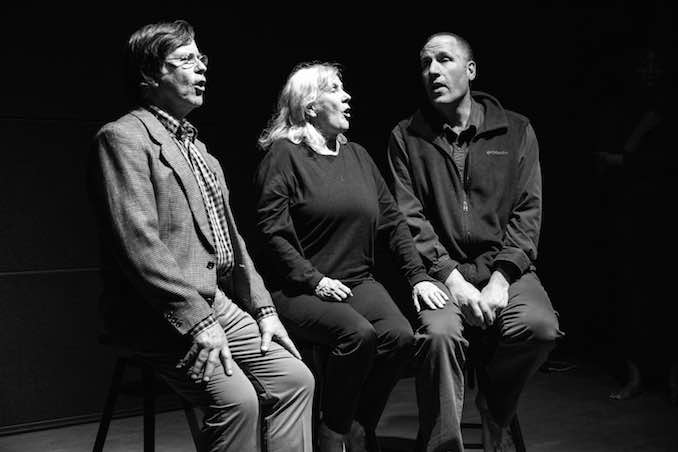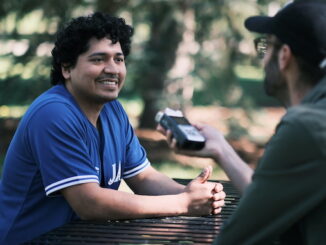Cantata (Rumours of My Crazy, Useless Life) By Clem Martini played April 28 – May 7, 2022 at Stage Theatre in Calgary, Alberta
When I was asked to review Cantata, a dramatization and fictionalization of Calgary writer Clem Martini’s experiences as a caregiver for a brother with schizophrenia, and a mother developing dementia, I mentally prepared myself. The subject matter is stark. The very real struggles of navigating an ever worsening healthcare system in Alberta, I expected would be difficult to stomach. The mental preparation turned out to be completely unnecessary. While these struggles are real and faced daily by many Albertans, the play failed to stir any deep emotional reactions in me.

Cantata is a loose adaptation of a book Martini co-wrote with his brother in 2017 called The Unravelling: How our caregiving safety net came unstrung and we were left grasping at threads, struggling to plait a new one. It should have remained a book. The overwhelming feeling I experienced while viewing this play, was one of being read to.
There is a story telling principle known as “show, don’t tell”, a technique which aims to allow the audience to experience the story through action, senses, and feelings. Cantata is squarely in the “tell, don’t show” camp; it relied heavily on exposition, summarization, and description to tell the story. The play was live scored by an onstage Marimba, which added the emotional atmosphere that the actors were not able to. It felt like watching a radio play.
Why trek all the way down to the Stage Theatre just to watch actors recite stage directions while standing side by side, delivering their lines to the back of the room, hardly looking at each other? In addition to excessive description the first act consisted heavily of monologues, each character speaking to the audience while the others sit in darkness. You can read an allegory of the theme into the staging – the isolation, but it’s too soon after a quarantine to want to watch such things. After a year of zoom meetings, of relating to others through isolated boxes on a screen, I want to see people together, in relationship, looking at each other, interacting.
Valeria Campbell turns in the most impressive work as Irene, a 90 year old woman suffering from dementia and facing the loss of her cherished freedom. Campbell seemed the most emotionally grounded in the text, and the play might have been better off pared down to a one woman show of Irene’s monologues.
The other actors, under the direction of Jason Mehmel, turned in mostly forgettable performances, although the isolating staging of the play robs them of their ability to create rich characters in any meaningful way. Duval Lang failed to convince me that he cared even one shred for his mother, whom he mostly nagged throughout the entire first act. This choice robbed his end-of-act-one blow up on her of any emotional impact; it was just the same attitude he had displayed to his mother the entire act long. Only louder.
I can’t say if the work redeemed itself in the second act, because I left at the intermission. Perhaps that was unfair, but for me, one hour is simply too long to ask an audience to watch four people stand in pools of light talking to the back wall. I wasn’t willing to risk another hour of the same in order to find out.
Other reviews of this play called it a “master class in writing, acting and directing”. I would say it is a play written by an academic for other academics. Would make a great radio play though.




